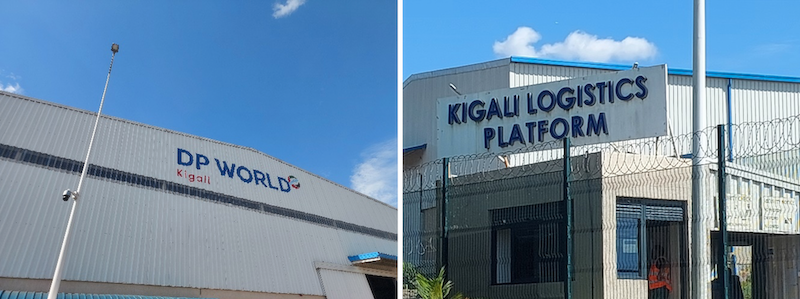Blog
tralac Annual Conference participants visit Masaka Dry Port in Kigali, Rwanda – lessons for implementation of the AfCFTA

As African countries prepare to implement and operationalise the African Continental Free Trade Area (AfCFTA), the effective implementation of the AfCFTA is now a key concern.
During the tralac Annual Conference held in Kigali, Rwanda from 18-19 May 2023, participants visited the Masaka Dry Port based in Kigali. The Commissioner for Customs Services, Félicien Mwumvaneza, accompanied the participants and provided an overview of the dry port facilities managed by Dubai Ports World.
Rwanda is a land-locked country. It has established the Masaka Dry Port to enhance its trade connectivity and cargo transport efficiency. Mr Mwumvaneza confirmed that the dry port, with a staff complement of 400, has effectively enhanced movement of goods from ports of entry in Kenya and Tanzania to Rwanda as well as neighbouring countries including Congo as well as from neighbouring countries to global destinations. Currently 95% of Rwandan cargo comes by road; 65% recorded from the Dar es Saleem port in Tanzania while 35% is from Mombasa, Kenya.
The Government of Rwanda signed an agreement in 2016 with Dubai Ports World (DPW) to develop the Kigali Logistics Platform; DPW will manage and operate the dry depot for 25 years from the date of completion of the logistics platform. Onsite services include customs inspection and clearance services, revenue services, maintenance and repair facilities, banking facilities and IT facilities. The dry port provides for loading and unloading from transport trucks, warehousing, and cold storage.

Dubai Ports World (DPW) developed the Kigali Logistics Platform to support in movement of goods
When cargo arrives at the port, an arrival notice is shared with the offices concerned with cargo processing to facilitate customs management and other border procedures. Digital tracking of cargo ensures that all border agencies are able to ensure the necessary compliance. The dry port provides storage, clearing and forwarding facilities for both import and export cargo.
A modern warehouse has capacity to accommodate over 6000 containers. Packing facilities are also available for fresh produce from local producers. It also has storage facilities to support food value chain processes. During the tour, we witnessed women packaging fresh chillies and avocado for export to targeted countries.

Avocados and chillies packaging at the Masaka port, Kigali, Rwanda
The dry port has different sections for different products, including motor vehicles (also electric vehicles which can be imported into Rwanda duty-free). Sugar and maize warehouses include packing facilities.
The objective of setting up the dry port was to streamline all the cargo facilities in Kigali and have a one stop facility that supports cargo processing, cold storage facilities, customs management to enhance the efficiency of the processes.
The dry port has already recorded multiple positive impacts for the country and specific sectors since it became operational in 2018. Rwanda plans to create more such facilities to enhance cargo processing as the country expands its other infrastructural facilities like the new Kigali airport which will target 160 destinations around the world, including cargo transportation. This will support the country’s economy as well as enhance movement of people, goods and services as envisaged by the African Continental Free Trade Area.
The Kigali Digital Platform has helped streamline the cargo facilitation and storage facilities for importers. The port offers free storage for goods that stay in the port for 3 days which encourages importers with fewer goods/products to clear them faster with no charges.
Previously, Rwanda had 13 agencies at the border post to manage cargo but with the Kigali digital platform in place, they now have only three agencies at the dry port. This is a testimony that digitisation is key to efficient trade facilitation.
About the Author(s)
Leave a comment
The Trade Law Centre (tralac) encourages relevant, topic-related discussion and intelligent debate. By posting comments on our website, you’ll be contributing to ongoing conversations about important trade-related issues for African countries. Before submitting your comment, please take note of our comments policy.
Read more...





